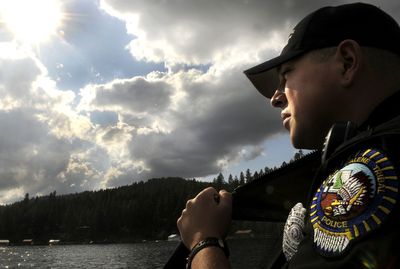Tensions linger
Racial incidents fewer, not unheard of, around Lake Coeur d’Alene

The Aryan Nations no longer is the top concern of a leading human rights activist in North Idaho.
Instead, Tony Stewart, co-founder of the Kootenai County Task Force on Human Relations, said he’s focused on what he views as mistreatment of Native Americans in the years since the U.S. Supreme Court awarded control of the lower third of Lake Coeur d’Alene to the Coeur d’Alene Tribe.
Stewart, who has traveled the country teaching other cities how to combat racist groups, said the racism expressed toward the tribe is the “best example” of how this region still struggles with bigotry.
That’s not necessarily a view shared by the chairman of the Coeur d’Alene Tribe, who attributes some of the behavior Stewart cites to anti-government or private-property-rights agendas.
But Stewart said four tribal members related a story to the task force a few years ago that he sees as a “clear example … of deep-seated, tragic prejudice.” During a meeting in St. Maries regarding the tribe’s plans for the lake, Stewart said, a man got up and said, “We should finish what we started in the 1800s.” What was perhaps more troubling, he added, was the response to the remark.
“Some members of the audience actually applauded.”
Stewart said that since the tribe regained ownership of the lake in 2001 and began charging dock fees, 90 percent of the population has been cooperative, but 10 percent has not and many of those have made racist comments. Prejudice is more likely to be displayed, Stewart said, when an incident occurs to spark it.
“The tribe has shown such dignity even when they have to deal with such offensive language,” Stewart said.
Coeur d’Alene Tribe Chairman Chief Allan said he has the greatest respect for Stewart, but feels he may be overstating the prejudice that exists against the tribe.
“I don’t think it’s gotten worse,” Allan said. “I think it’s gotten better. The tribe is thriving.”
Allan said that as a youth, he remembers experiencing prejudice in Spokane, being watched or followed when he went into stores and restaurants. He said he believes things have changed for the better, especially since the tribe became a major economic player in the region.
“Let’s be honest; there is racism on both sides,” Allan said. “The best defense against racism is education.”
Allan acknowledges, however, that work remains to be done in tribal relationships with some government entities and residents.
In October 2007, the Benewah County Sheriff’s Department ended an agreement to cross-deputize tribal police officers, as Kootenai County does. That means tribal police can detain, but not arrest, violators until sheriff’s deputies or Idaho State Police arrive.
Then in July, tribal police patrolling the lake pulled over Benewah County Commission Chairman Jack Buell and his wife, Eleanor, for allegedly violating a no-wake zone. The police report said that the Buells made racially motivated comments to the officers during the stop. In addition, tribal police are asking federal authorities to charge Eleanor Buell with felony assault on a police officer after she allegedly struck one of the officer’s hands.
The U.S. Attorney’s Office has not decided whether to file charges in the alleged assault on Officer John Dressler, a Coeur d’Alene Tribe member.
When media reports of the incident came out, Shoshone County commissioners adopted a unanimous resolution supporting Jack Buell, criticizing The Spokesman-Review for its coverage and commending Buell for his service to the community.
The Buells did not respond to repeated requests from The Spokesman-Review for comment at the time. However, a St. Maries Gazette Record story said the Buells denied the accusations and added that two witnesses, a nearby fisherman and a passenger in the Buells’ boat, disputed the police version of events.
Allan, the Coeur d’Alene Tribe’s chairman, regrets that Benewah County has severed the cross-deputizing agreement.
“The tribe has a lot to offer and is willing to help these local communities, like Benewah County, who need help,” he said. “When they are not willing to work together it makes the tribe scratch our heads and wonder why.”
He sees plenty of hope in the relationships the tribe has forged with the state of Idaho and Kootenai County, he said.
This year for the first time, the Governor’s Cup fundraising golf tournament was held in North Idaho, at tribe-owned Circling Raven Golf Course. The event raised $750,000 for high school scholarships, and Allan is proud of the outcome.
“Twenty years ago, that wouldn’t have happened.”